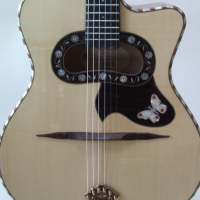DjangoBooks.com
Welcome to our Community!
Categories
- 18K All Categories
- 396 General
- 257 Welcome
- 10 Archtop Eddy's Corner
- 74 CD, DVD, and Concert Reviews
- 29 FAQ
- 9 Gypsy Jazz Italia
- 17 Photos
- 24 Gypsy Picking
- 3 Unaccompanied Django
- 1 Pearl Django Play-Along Vol.1
- 1 Gypsy Fire
- 21 Gypsy Rhythm
- 553 Gypsy Jazz University - Get Educated
- 104 Gypsy Jazz 101
- 176 Repertoire
- 129 History
- 88 Technique
- 39 Licks and Patterns
- Daniel Givone Manouche Guitare Method Users Group
- 17 Eddie Lang Club
- 1K Gypsy Jazz Gear
- 648 Guitars, Strings, Picks, Amps, Pickups and Other Accessories
- 316 Classifieds
- 36 Recording
- 38 Other Instruments
- 17 Violin
- 3 Mandolin
- 6 Accordion
- 3 Bass
- 9 Woodwinds
- 197 Gypsy Jazz Events
- 78 North America
- 81 Europe
- 38 International
In this Discussion
Who's Online 0
Why are guitars wet or dry ?
 constantine
New York✭✭✭✭ Geronimo Mateos
constantine
New York✭✭✭✭ Geronimo Mateos
Outside of spilling beer, why are some gypsy guitars wet? What is it about how they are built , the poly, the bracing?









Comments
I doubt any luthier would tell you his secrets but wetness often seems to be caused by an overly thin top, miss placed braces or braces that aren't big enough, lack of or misplacement of tone bars, too much neck angle, overly high action, etc.
Hard to pin it down exactly, but guys like Dupont surely know as his guitars are always ultra crisp. Busato even more so....
If you use your thumb to distort (dent) the top (between the braces) of a Dupont or other high end guitar, you can't dent it much. The same trick on the lesser guitars will give you more distortion.
Also the braces (and top wood) are prone to sag on the cheaper guitars, whereas the great guitars built 60 and 70 years ago have yet to sag. Better wood (maybe thicker or well seasoned) braces.
My point is that the loose tops (via weaker or wetter or unseasoned wood) don't vibrate as a unit very well, hence a lot of overtones get going besides the fundamental sound of the note simply because the top is able to flop around more reflecting overtones. A tight top (like a tight drum head) will tend to accentuate the fundamental note being played more simply and directly = dry. Overall stiffness and lighness will make a difference too. Our poor little strings trying to vibrate a 6 pound guitar tends to result in the vibration getting diffused and distorted away from the fundamental.
There may be other reasons, but that's my story.
The backs of Gitanes and Ciganos are by contrast even tighter than Duponts, but the top is the big developer of the sound.
Changing bridges and strings only gets a marginal (still important) change in sound. A guitar body wants to ring its own way and defines the sound more than anything else.
With a stiff-light (well made) guitar the string can power the whole thing up quickly and accurately.